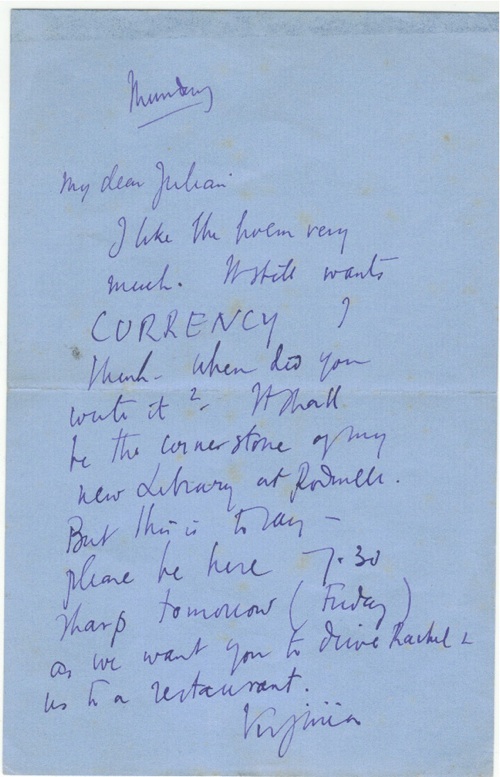In Woolf's Clothing: Poetry Advice from Virginia to her Nephew
The Paris Review Daily shows us a scan of a lovely periwinkle letter from Virginia Woolf to her nephew Julian Thoby Stephen (son of sister Vanessa Bell). When asked, Woolf was known to provide sharp criticism, and the Paris Review transcribes her letter as follow:
Monday. My dear Julian. I like the poem very much. It still wants CURRENCY I think. When did you write it? It shall be the cornerstone of my new library at Rodmell. But this is to say—please be here 7:30 sharp tomorrow (Friday) as we want you to drive Rachel & us to a restaurant.
To decode: Rodmell was the location of Woolf's home. (Our gratitude goes to a Woolfian and Harriet peruser who points out that Woolf wrote "Thursday," not "Monday.")
Sarah Funke Butler, who curated a seriously interesting show about Virginia Woolf's writing life at the Grolier Club in 2009, writes of the letter:
Woolf’s blunt criticism of Julian’s poem, her dig that it might be mere youthful experiment, the leavening (yet peremptory) dollop of praise, and the call to chores all typify the complexity of their relationship. The following year, after Julian’s first book of poems came out, Virginia declared, “He is no poet.” She once described her relationship to him as “half sister, half mother, and half (but arithmetic denies this) the mocking stirring contemporary friend.” Though she frequently expressed criticism of his writing, she ultimately published one of his books at the Hogarth Press.
To decode some more: Woolf operated the Hogarth Press with her husband, Leonard. They published plentiful works by luminaries such as Katherine Mansfield, Christopher Isherwood, Robert Graves, T.S. Eliot, C. Day Lewis, E.M. Forster, John Maynard Keynes, and, of course, themselves.
Butler continues:
But Julian’s career would be short-lived. Like his namesake Thoby, he did not see his thirtieth birthday. In his late twenties he took up the Republican cause in the Spanish Civil War, enlisting as an ambulance driver, and was killed at the Battle of Brunete in 1937. Virginia committed suicide in 1941; this year marks the seventieth anniversary of her death.
Visit the full post here.



